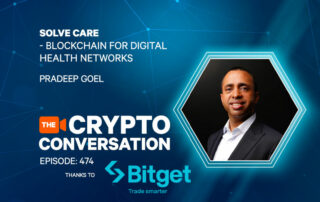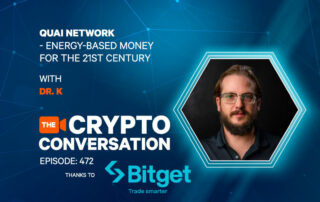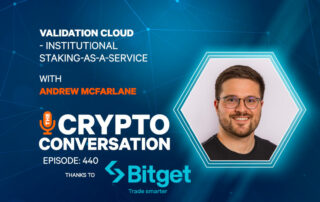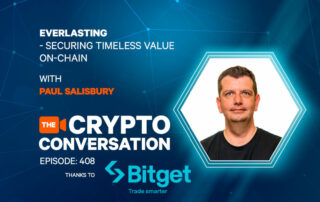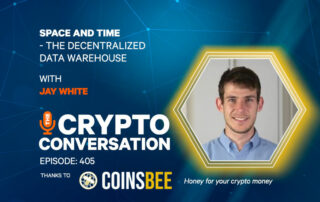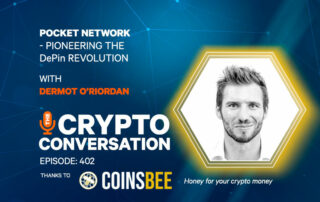SCRYPT – A Swiss Financial Service Provider for Crypto
Norman Wooding is co-founder and CEO of SCRYPT, a leading Swiss financial service provider specializing in crypto assets.
Saito – A Paradigm Shift in Blockchain Applications
Richard Parris is a co-founder at Saito - a self-sufficient Layer 1 Blockchain designed for devs that provides the foundation for building open and scalable web applications.
Solve Care – Blockchain for Digital Health Networks
Pradeep Goel is the Chief Executive Officer at the Solve Care Foundation. Solve Care is a blockchain platform for digital health networks.
Quai Network – Energy-based Money for the 21st Century
Dr. K is the Co-Founder of Quai Network, a new Layer 1 network of blockchains designed to scale to handle all human commerce while maintaining true decentralization.
Validation Cloud – Institutional Staking-as-a-Service
Andrew McFarlane is CTO at Validation Cloud an Institutional Staking-as-a-Service provider and Web3 infrastructure platform.
Predictoor – Decentralized Prediction Feeds
Trent McConaghy is an AI and blockchain expert and the founder of Ocean Protocol, a decentralized data marketplace. Ocean’s newest product is Predictoor, a decentralized prediction feed platform.
Pharma DAO – Reinventing Healthcare
Gennaro D'Urso is the founder of Pharma Collective and Israel Mirsky is the Director at Pharma Collective. Gennaro has a background in science and entrepreneurship, while Israel comes from the advertising industry and has experience in the pharmaceutical psychedelic space.
Everlasting – Securing Timeless Value On-chain
Paul Salisbury is the co-founder of Everlasting, a digital currency hybrid custody initiative founded in New Zealand. Everlasting provides users with sovereignty over their assets while mitigating risks such as hacks or loss of funds. The goal is to offer a robust solution that can cater to individual investors, asset managers, and high-net-worth individuals.
Dolomite – A next-gen Money Market on Arbitrum
Corey Caplan and Adam Knuckey are the co-founders of Dolomite, a next-generation money market and margin trading protocol built on Arbitrum.
Space and Time – the Decentralized Data Warehouse
Jay White is the co-founder of Space and Time, a decentralized data warehouse. Space and Time can be understood as a web3 native database platform with applications in gaming and DeFi.
Veloce To Deploy Vext On Polygon – Evolving To Become The First Decentralised Global Sporting Group
Veloce, the world’s leading digital racing media network, will be launching its Utility and Governance token, VEXT, on September 4th, 2023.
Spacemesh – Fairness through Proof of Space and Time
Tomer Afek is the CEO and Co-founder of Spacemesh, a layer 1 Proof of Space Time (PoST) protocol. Following mainnet launch on the 14th of July 2023 they have created the “People’s Coin” magic internet money, that anyone can mine from home, no special mining gear required.
Pocket Network – Pioneering the DePin revolution
Dermot O’Riordan is the director of Pocket Network. Pocket Network's mission is to build censorship-resistant technology to lay the foundation for reorganizing the world’s institutions toward a more equitable, hyper-connected, interplanetary future.
The Comeback Kid – Can EOS Return to Glory?
Yves La Rose is the CEO of the EOS Network Foundation and a modern-day samurai. EOS was the largest ICO and raised over $4 billion in the biggest initial coin offering of all time. With its promise of being more efficient than other cryptocurrencies, EOS gained a reputation as "Ethereum on Steroids." Over time, however, users declined, its token's value declined, and developers left the project. Yves La Rose and the EOS community are determined to bring EOS back from the dead.
Guide to Writing and Using Smart Contracts
In blockchain technology, smart contracts have become a transformative force. The way transactions are carried out is about to undergo a revolution thanks to these self-executing contracts encoded with predefined conditions.
RWA – A new revolution in digital asset issuance
Real World Asset Tokenization appears to be primed to unlock trillions of dollars of value. The new abstraction is poised to disrupt traditional markets and create unparalleled investment opportunities for a new generation of investors.


